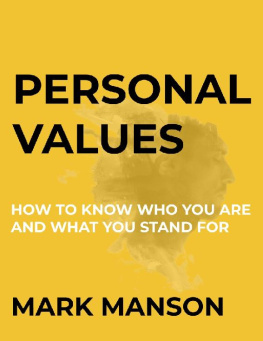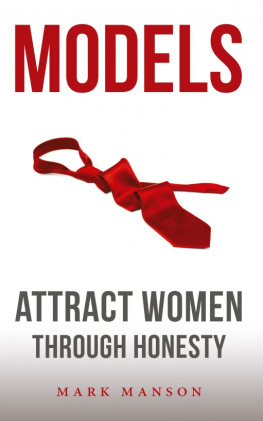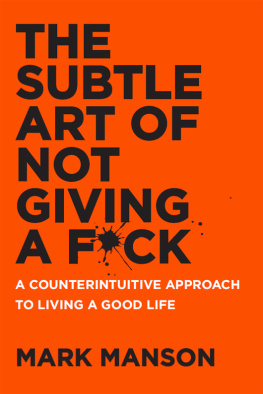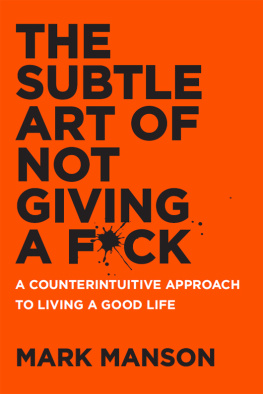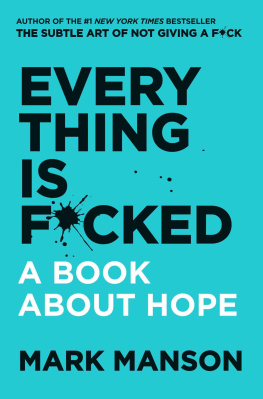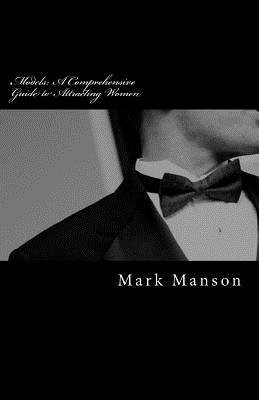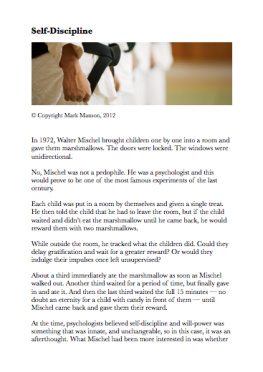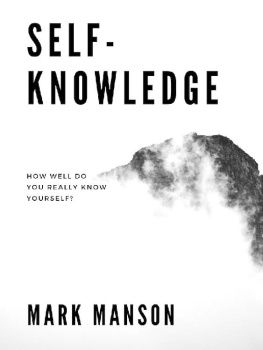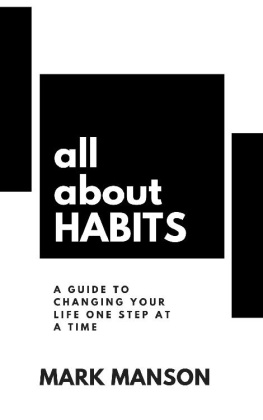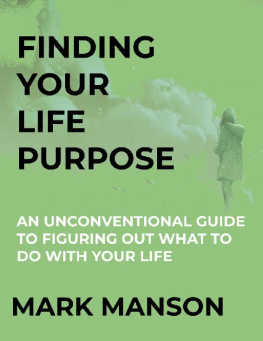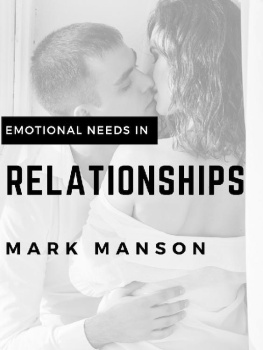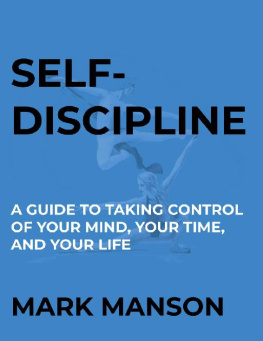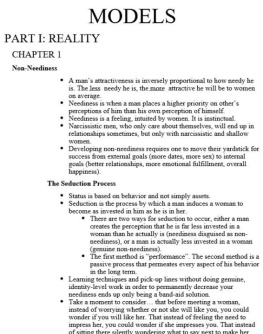Mark Manson - Personal Values: How To Know Who You Are and What You Stand For
Here you can read online Mark Manson - Personal Values: How To Know Who You Are and What You Stand For full text of the book (entire story) in english for free. Download pdf and epub, get meaning, cover and reviews about this ebook. year: 2019, genre: Religion. Description of the work, (preface) as well as reviews are available. Best literature library LitArk.com created for fans of good reading and offers a wide selection of genres:
Romance novel
Science fiction
Adventure
Detective
Science
History
Home and family
Prose
Art
Politics
Computer
Non-fiction
Religion
Business
Children
Humor
Choose a favorite category and find really read worthwhile books. Enjoy immersion in the world of imagination, feel the emotions of the characters or learn something new for yourself, make an fascinating discovery.
- Book:Personal Values: How To Know Who You Are and What You Stand For
- Author:
- Genre:
- Year:2019
- Rating:4 / 5
- Favourites:Add to favourites
- Your mark:
- 80
- 1
- 2
- 3
- 4
- 5
Personal Values: How To Know Who You Are and What You Stand For: summary, description and annotation
We offer to read an annotation, description, summary or preface (depends on what the author of the book "Personal Values: How To Know Who You Are and What You Stand For" wrote himself). If you haven't found the necessary information about the book — write in the comments, we will try to find it.
Personal Values: How To Know Who You Are and What You Stand For — read online for free the complete book (whole text) full work
Below is the text of the book, divided by pages. System saving the place of the last page read, allows you to conveniently read the book "Personal Values: How To Know Who You Are and What You Stand For" online for free, without having to search again every time where you left off. Put a bookmark, and you can go to the page where you finished reading at any time.
Font size:
Interval:
Bookmark:
MARKMANSON.NET 2019 Mark Manson PART 1: PERSONAL VALUES WHATS THE POINT OF VALUES ANYWAY? For the last few years, Ive had an idea for a satirical self-help article called, The Productivity Secrets of Adolf Hitler. The article would feature all the popular self-help tropesgoals, visualizations, morning routinesexcept expressed through the exploits of Hitler. Hitler starts his day at 5 AM each morning with a quick round of yoga and five minutes of journaling, hes able to focus his mind on his highly ambitious goals. Hitler discovered his life purpose in a beer hall in his 20s and has since followed it relentlessly, thus infusing his life with passion and inspiring millions of others like himself. Adolf is a strict vegetarian, and makes sure to find time in his busy schedule of genocide and world domination to explore his creative side : he sets aside a few hours each week to listen to opera and paint his favorite landscapes. I know that I would find the article hilarious. But thats because Im a sick, twisted fuck. But in the end, Ive never quite worked up the courage to write the thing, for obvious reasons. Ive been doing this long enough to know that a) a bunch of people would get offended and devote themselves entirely to ruining my week with annoying emails and social media screeds, b) the satire would go over a bunch of peoples heads and theyd think that I was actually a Nazi, and c) some awful publication somewhere would run the headline, Bestselling author outs himself as alt-right neo-Nazi or some shit and my career would summarily be over. So, Ive never written the article. Call me a coward. But it is what it is. But it bugs me a little bit because I think satirizing Hitlers incredible productivity and influence perfectly embodies a point Ive long made about the self-help world : achieving success in life is not nearly as important as our definition of success. If our definition of success is horrificlike, say, world domination and slaughtering millionsthen working harder , setting and achieving goals , and disciplining our minds all become a bad thing. If you remove the moral horrors from Hitler, on paper, hes one of the most successful self-made people in world history. He went from being a broke, failed artist, to commandeering an entire country and the most powerful military in the world in a matter of two decades. He mobilized and inspired millions. He was tireless and shrewd and intensely focused on his goals. He arguably influenced world history as much as anyone who has ever lived. But all of that work went toward demented, destructive aims. And tens of millions of people died due to his misguided values. Therefore, you cannot talk about self-improvement without also talking about values. Its not enough to simply grow and become a better person. You must define what a better person is. You must decide in which direction you wish to grow. Because if you dont, well, we might all be screwed. A lot of people dont realize this. A lot of people obsessively focus on being happy and feeling good all the time not realizing that if their values suck, feeling good will hurt them more than help them. If your biggest value in the world is snorting Vicodin through a swirly straw, well, then feeling better is just going to make your life worse. When I wrote my book, The Subtle Art of Not Giving a F*ck , pretty much the entire book was really just a sneaky way to get people to think about their values more clearly. There are a million self-help books out there that teach you how to better achieve your goals, but few actually question what goals you should have in the first place. My aim was to write a book that did just that. In the book, I intentionally avoided getting too deep into what good/bad values arewhat they look like, and why they work or dont workpartly because I didnt want to push my own values onto the reader. After all, the whole point of your values is that you adopt them yourself, not because some dude with an obnoxious orange book cover told you to. But if Im being honest, I also didnt get too deep into defining values because its an incredibly difficult topic to write about well. So, this article is my attempt to finally do that. To talk about values. And not just what they are but why they are. Why we find certain things important, what the consequences of that importance are, and how we can go about changing what we find important. Its not a simple subject. And the article is quite long. So enough of me blabbing, lets get on with it. WHAT ARE YOUR PERSONAL VALUES? Every moment of every day, whether you realize it or not, you are making a decision of how to spend your time, of what to pay attention to, of where to direct your energy. Right now, you are choosing to read this ebook. There are an infinite number of things you could be doing, but right now, you are choosing to be here. Maybe in a minute, you decide you need to pee. Or maybe someone texts you and you stop reading. When those things happen, you are making a simple, value-laden decision: your phone (or your toilet) is more valuable to you than this article. And your behavior follows that valuation accordingly. Our values are constantly reflected in the way we choose to behave. This is critically importantbecause we all have a few things that we think and say we value, but we never back them up with our actions. I can tell people (and myself) until Im blue in the face that I care about climate change or the dangers of social media , but if I spend my days driving around in a gas-guzzling SUV and constantly refreshing my news feeds, then my behaviors tell a different story.
Actions dont lie. We believe we want to get that job, but when push comes to shove, were always kind of relieved that no one called us back so we can retreat to our video games again. We tell our girlfriend we really want to see her, but the minute our guy friends call, our schedule magically seems to open up like fucking Moses parting the Red Sea. Many of us state values we wish we had as a way to cover up the values we actually have. In this way, aspiration can often become another form of avoidance. Instead of facing who we really are, we lose ourselves in who we wish to become. Put another way: we lie to ourselves because we dont like some of our own values, and we therefore dont like a part of ourselves . We dont want to admit we have certain values and that we wish we had other values, and its this discrepancy between self-perception and reality that usually gets us into all sorts of trouble. Thats because our values are extensions of ourselves. They are what define us. When something good happens to something or someone you value, you feel good. When your mom gets a new car or your husband gets a raise or your favorite sports team wins a championship, you feel goodas though these things happened to you yourself. The opposite is true as well. If you dont value something, you will feel good when something bad happens to it. People took to the streets cheering when Osama Bin Laden was killed. People threw a party outside the prison where the serial killer Ted Bundy was executed. The destruction of someone perceived as evil felt like some great moral victory in the hearts of millions. So, when we are disconnected from our own valueswe value playing video games all day yet believe we value ambition and hard workour beliefs and ideas get disconnected from our actions and emotions. And to bridge that disconnect, we must become delusional about ourselves and about the world. |
Font size:
Interval:
Bookmark:
Similar books «Personal Values: How To Know Who You Are and What You Stand For»
Look at similar books to Personal Values: How To Know Who You Are and What You Stand For. We have selected literature similar in name and meaning in the hope of providing readers with more options to find new, interesting, not yet read works.
Discussion, reviews of the book Personal Values: How To Know Who You Are and What You Stand For and just readers' own opinions. Leave your comments, write what you think about the work, its meaning or the main characters. Specify what exactly you liked and what you didn't like, and why you think so.

